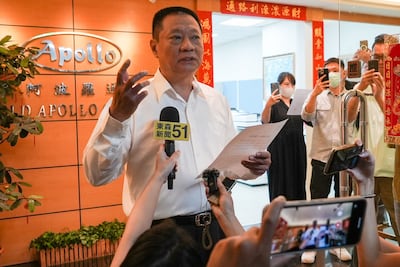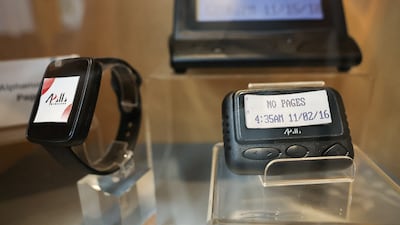Live updates: Follow the latest on Israel-Gaza
A Taiwanese pager manufacturer is being scrutinised after devices bearing its logo and name were detonated in a mass attack in Lebanon and Syria.
Tuesday's attacks, which injured thousands of users and killed 12, were aimed at the Lebanese militant group Hezbollah. The group blamed Israel for the explosions and said it was launching an investigation. Israel has not commented on the incident, in which civilians were also harmed, including a nine-year-old girl.
Experts told The National that Hezbollah's attempt to use older technology to avoid hacking by Israel backfired and that the pagers were probably loaded with an explosive charge.
Israel may have infiltrated the supply chain for Hezbollah's pagers, they said. The New York Times reported that Israel hid explosive material within a new batch before they were imported to Lebanon, citing US and other officials.
It is not yet clear where or when explosives were added to the devices.
Gold Apollo's chief executive and founder said he felt like a “victim” after European brand BAC Consulting KTF, based in Hungary, was granted a licence to use the Gold Apollo name in certain regions.
“There is no problem with pagers exported from Taiwan exploding,” Taiwan’s Ministry of Foreign Affairs said in a statement in response to media inquiries, adding that the case is under investigation.
The pagers were brought into Lebanon earlier this year, a senior Lebanese security source told Reuters, but it is not yet known when or how they were turned into explosive devices.
Here's what we know so far about the origin of the pagers and the companies involved.
What is Gold Apollo?
Gold Apollo is a Taiwanese firm founded in 1995, producing one-way message devices among more modern technology and radio equipment. It has 40 employees, according to Bloomberg.
However, the company said it does not make the AR-924 model of pager that a Lebanese security source told Reuters was sold to the Lebanese group. It said this was made by a company called BAC Consulting KTF.
Gold Apollo founder Hsu Ching-Kuang said the pagers used in the explosion, of which Iran-backed Hezbollah reportedly bought 5,000, were made by BAC, a company in Europe.
“The product was not ours. It was only that it had our brand on it,” Mr Hsu said at the company's offices in the northern Taiwanese city of New Taipei on Wednesday. He said Gold Apollo had been working with BAC for three years.
Taiwan's Ministry of Economic Affairs said it had no evidence of pagers being shipped to Lebanon. Most of the 260,000 Gold Apollo pagers sent out between January 2022 and August 2024 were sent to Australia and the US, it said in a statement.
What is known about BAC Consulting KTF?
BAC's website was down on Wednesday morning, and the company's address appeared to be a residential street in Budapest.
Google first indexed the site more than 10 years ago, on which the company was advertised as “actively involved in International Relations to examine social science and humanities through an international lens”.
On the pages still available to view on the internet archive Wayback Machine, providing communications devices was not listed as a service, but other interests were wide-ranging, from computer game publishing to IT consulting to crude oil extraction.
Phone calls to the number listed on the site from The National would not connect.
The company's chief executive is listed on its website and her own LinkedIn profile as Cristiana Barsony-Arcidiacono.
In a phone call with NBC News, Ms Barsony-Arcidiacono denied direct involvement.
“I don’t make the pagers. I am just the intermediate. I think you got it wrong,” she said.
Gold Apollo said it authorised “BAC to use our brand trademark for product sales in specific regions, but the design and manufacturing of the products are entirely handled by BAC”.
Mr Hsu said earlier there had been problems with remittances from the firm. “The remittance was very strange,” he said, adding that payments had come through the Middle East. He did not elaborate further.
Hungarian Prime Minister Viktor Orban's government said the devices used in the attack were never in Hungary.
“Hungarian authorities have established that the company in question is a trading-intermediary company, which has no manufacturing or other site of operation in Hungary,” government spokesman Zoltan Kovacs said on Facebook.
UAE currency: the story behind the money in your pockets
New UK refugee system
- A new “core protection” for refugees moving from permanent to a more basic, temporary protection
- Shortened leave to remain - refugees will receive 30 months instead of five years
- A longer path to settlement with no indefinite settled status until a refugee has spent 20 years in Britain
- To encourage refugees to integrate the government will encourage them to out of the core protection route wherever possible.
- Under core protection there will be no automatic right to family reunion
- Refugees will have a reduced right to public funds
Tori Amos
Native Invader
Decca
Results
- Brock Lesnar retained the WWE Universal title against Roman Reigns
- Braun Strowman and Nicolas won the Raw Tag Team titles against Sheamus and Cesaro
- AJ Styles retained the WWE World Heavyweight title against Shinsuke Nakamura
- Nia Jax won the Raw Women’s title against Alexa Bliss
- Daniel Bryan and Shane McMahon beat Kevin Owens and Sami Zayn
- The Undertaker beat John Cena
- The Bludgeon Brothers won the SmackDown Tag Team titles against the Usos and New Day
- Ronda Rousey and Kurt Angle beat Triple H and Stephanie McMahon
- Jinder Mahal won the United States title against Randy Orton, Rusev and Bobby Roode
- Charlotte retained the SmackDown Women’s title against Asuka
- Seth Rollins won the Intercontinental title against The Miz and Finn Balor
- Naomi won the first WrestleMania Women’s Battle Royal
- Cedric Alexander won the vacant Cruiserweight title against Mustafa Ali
- Matt Hardy won the Andre the Giant Battle Royal
SPECS%3A%20Polestar%203
%3Cp%3E%3Cstrong%3EEngine%3A%20%3C%2Fstrong%3ELong-range%20dual%20motor%20with%20400V%20battery%3Cbr%3E%3Cstrong%3EPower%3A%20%3C%2Fstrong%3E360kW%20%2F%20483bhp%3Cbr%3E%3Cstrong%3ETorque%3A%20%3C%2Fstrong%3E840Nm%3Cbr%3E%3Cstrong%3ETransmission%3A%20%3C%2Fstrong%3ESingle-speed%20automatic%3Cbr%3E%3Cstrong%3EMax%20touring%20range%3A%3C%2Fstrong%3E%20628km%3Cbr%3E%3Cstrong%3E0-100km%2Fh%3A%3C%2Fstrong%3E%204.7sec%3Cbr%3E%3Cstrong%3ETop%20speed%3A%3C%2Fstrong%3E%20210kph%20%3Cbr%3E%3Cstrong%3EPrice%3A%20%3C%2Fstrong%3EFrom%20Dh360%2C000%3Cbr%3E%3Cstrong%3EOn%20sale%3A%20%3C%2Fstrong%3ESeptember%3Cbr%3E%3C%2Fp%3E%0A
The five pillars of Islam
1. Fasting
2. Prayer
3. Hajj
4. Shahada
5. Zakat
ANATOMY%20OF%20A%20FALL
%3Cp%3E%3Cstrong%3EDirector%3A%20%3C%2Fstrong%3EJustine%20Triet%3C%2Fp%3E%0A%3Cp%3E%3Cstrong%3EStarring%3A%20%3C%2Fstrong%3ESandra%20Huller%2C%20Swann%20Arlaud%2C%20Milo%20Machado-Graner%3C%2Fp%3E%0A%3Cp%3E%3Cstrong%3ERating%3A%3C%2Fstrong%3E%205%2F5%3C%2Fp%3E%0A
How to apply for a drone permit
- Individuals must register on UAE Drone app or website using their UAE Pass
- Add all their personal details, including name, nationality, passport number, Emiratis ID, email and phone number
- Upload the training certificate from a centre accredited by the GCAA
- Submit their request
What are the regulations?
- Fly it within visual line of sight
- Never over populated areas
- Ensure maximum flying height of 400 feet (122 metres) above ground level is not crossed
- Users must avoid flying over restricted areas listed on the UAE Drone app
- Only fly the drone during the day, and never at night
- Should have a live feed of the drone flight
- Drones must weigh 5 kg or less
Bawaal%20
%3Cp%3E%3Cstrong%3EDirector%3A%3C%2Fstrong%3E%20Nitesh%20Tiwari%3C%2Fp%3E%0A%3Cp%3E%3Cstrong%3EStars%3A%3C%2Fstrong%3E%20Varun%20Dhawan%2C%20Janhvi%20Kapoor%3C%2Fp%3E%0A%3Cp%3E%3Cstrong%3ERating%3A%3C%2Fstrong%3E%201%2F5%3C%2Fp%3E%0A
Groom and Two Brides
Director: Elie Semaan
Starring: Abdullah Boushehri, Laila Abdallah, Lulwa Almulla
Rating: 3/5
The five pillars of Islam
More from Neighbourhood Watch:
Veil (Object Lessons)
Rafia Zakaria
Bloomsbury Academic
Profile of VoucherSkout
Date of launch: November 2016
Founder: David Tobias
Based: Jumeirah Lake Towers
Sector: Technology
Size: 18 employees
Stage: Embarking on a Series A round to raise $5 million in the first quarter of 2019 with a 20 per cent stake
Investors: Seed round was self-funded with “millions of dollars”
The Perfect Couple
Starring: Nicole Kidman, Liev Schreiber, Jack Reynor
Creator: Jenna Lamia
Rating: 3/5
'The Woman in the House Across the Street from the Girl in the Window'
Director:Michael Lehmann
Stars:Kristen Bell
Rating: 1/5
Company%20Profile
%3Cp%3E%3Cstrong%3EName%3A%3C%2Fstrong%3E%20Ovasave%3Cbr%3E%3Cstrong%3EStarted%3A%3C%2Fstrong%3E%20November%202022%3Cbr%3E%3Cstrong%3EFounders%3A%3C%2Fstrong%3E%20Majd%20Abu%20Zant%20and%20Torkia%20Mahloul%3Cbr%3E%3Cstrong%3EBased%3A%3C%2Fstrong%3E%20Abu%20Dhabi%3Cbr%3E%3Cstrong%3ESector%3A%3C%2Fstrong%3E%20Healthtech%3Cbr%3E%3Cstrong%3ENumber%20of%20staff%3A%3C%2Fstrong%3E%20Three%20employees%3Cbr%3E%3Cstrong%3EInvestment%20stage%3A%3C%2Fstrong%3E%20Pre-seed%3Cbr%3E%3Cstrong%3EInvestment%3A%3C%2Fstrong%3E%20%24400%2C000%3C%2Fp%3E%0A
DMZ facts
- The DMZ was created as a buffer after the 1950-53 Korean War.
- It runs 248 kilometers across the Korean Peninsula and is 4km wide.
- The zone is jointly overseen by the US-led United Nations Command and North Korea.
- It is littered with an estimated 2 million mines, tank traps, razor wire fences and guard posts.
- Donald Trump and Kim Jong-Un met at a building in Panmunjom, where an armistice was signed to stop the Korean War.
- Panmunjom is 52km north of the Korean capital Seoul and 147km south of Pyongyang, North Korea’s capital.
- Former US president Bill Clinton visited Panmunjom in 1993, while Ronald Reagan visited the DMZ in 1983, George W. Bush in 2002 and Barack Obama visited a nearby military camp in 2012.
- Mr Trump planned to visit in November 2017, but heavy fog that prevented his helicopter from landing.
The White Lotus: Season three
Creator: Mike White
Starring: Walton Goggins, Jason Isaacs, Natasha Rothwell
Rating: 4.5/5
The specs
Engine: 3.5-litre V6
Power: 272hp at 6,400rpm
Torque: 331Nm from 5,000rpm
Transmission: 8-speed auto
Fuel consumption: 9.7L/100km
On sale: now
Price: Dh149,000



